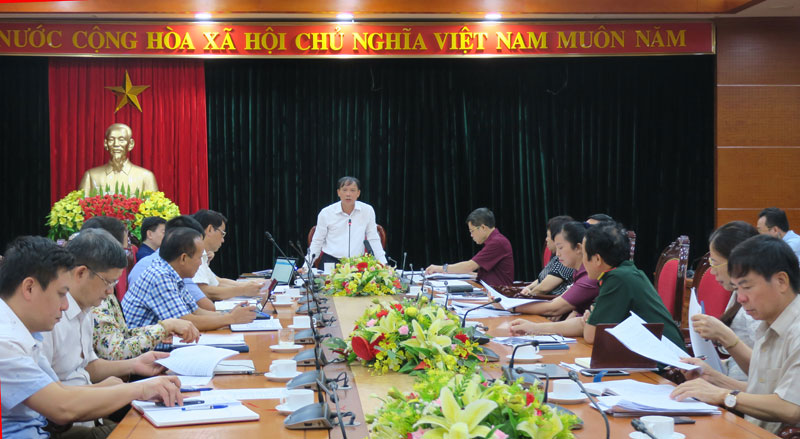
(HBO) - Vice Secretary of the Hoa Binh provincial Party Committee and Chairman of the provincial People’s Committee Bui Van Khanh made the direction during a meeting of the provincial Steering Committee on Administrative Reform on June 16. The meeting aimed to assess the Provincial Administrative Reform Index (PAR) 2019, discuss preparations for a conference reviewing the comprehensive administrative reform scheme for the 2011-2020 period, and tasks for 2021-2030.
 Vice Secretary of the
provincial Party Committee and Chairman of the provincial People’s Committee
Bui Van Khanh speaks at the meeting.
Vice Secretary of the
provincial Party Committee and Chairman of the provincial People’s Committee
Bui Van Khanh speaks at the meeting.
Last year, the provincial Steering Committee on Administrative
Reform drastically directed administrative reform tasks. As a result, the
province improved performance in several criteria compared to 2018. New
initiatives and measures were implemented effectively while qualified personnel
were appointed in line with regulations. More documents were processed via the
public service portal at levels 3 and 4. Therefore, the score based on verified
documents in 2019 increased by 14.2 percent from 2018, and assessment score based
on sociological surveys of local leaders and surveys of public satisfaction about
service of State administrative agencies also increased significantly compared
to 2018.
However, the province’s PAR index only reached 79.44 percent
in 2019, placing the locality the 52nd out of 63 cities and
provinces, down six spots from 2018.
Concluding the event, Khanh lauded efforts by the provincial
departments and agencies to improve the PAR index and asked them to indentify existing
shortcomings to timely address them. In order to raise the local PAR index
ranking this year, he called for active involvement of the entire political
system. In the near future, the steering committee will convene quarterly
meetings and set up inspection teams to check administrative reform in units,
agencies and localities. Communication work should be promoted to raise public
awareness of the effort, and the result of the work must be included in the
annual assessment of units and localities’ performance, especially
responsibility of the top leaders./.
Hoa Binh province is steadily advancing its agricultural sector through the adoption of high-tech solutions, seen as a sustainable path for long-term development.
The steering committee for key projects of Hoa Binh province convened on May 14 to assess the progress of major ongoing developments
A delegation of Hoa Binh province has attended the "Meet Korea 2025" event, recently held by the Ministry of Foreign Affairs, the Embassy of the Republic of Korea (RoK) in Vietnam, the Korea Trade-Investment Promotion Agency, and the People's Committee of Hung Yen province.
Hoa Binh province joined Vietnam’s national "One Commune, One Product” (OCOP) programme in 2019, not simply as a mountainous region following central policy, but with a clear vision to revive the cultural and agricultural values in its villages and crops.
From just 16 certified products in its inaugural year to 158 by early 2025, the One Commune One Product (OCOP) programme in Hoa Binh province has followed a steady and strategic path. But beyond the numbers, it has reawakened local heritage, turning oranges, bamboo shoots, brocade, and herbal remedies into branded, market-ready goods - and, more profoundly, transformed how local communities value and present their own cultural identity.
"Behind every One Commune One Product (OCOP)-starred product lies a quietly operating support system: technical staff, experts, trade fairs, and e-commerce platforms. OCOP cannot go far without forward-looking policy support," affirmed Nguyen Huy Nhuan, Director of the Department of Agriculture and Environment of Hoa Binh province.



 Vice Secretary of the
provincial Party Committee and Chairman of the provincial People’s Committee
Bui Van Khanh speaks at the meeting.
Vice Secretary of the
provincial Party Committee and Chairman of the provincial People’s Committee
Bui Van Khanh speaks at the meeting.